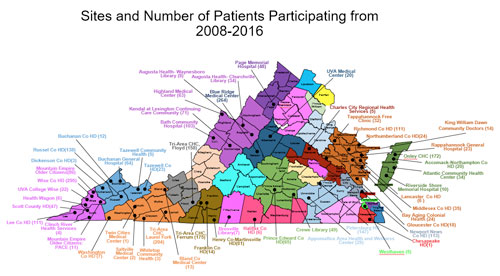University of Virginia Diabetes Tele-Education Program
- Need: To educate people in rural Virginia who either have diabetes or are considered at high risk for developing it.
- Intervention: Teleconferencing technology is used to offer diabetes education programs to people with diabetes or those at high risk for developing it. Health professionals are also indirectly trained in diabetes care and management.
- Results: Participants reported better prevention practices and/or self-management of diabetes after being thoroughly educated about this condition.
Description
Portions of rural Virginia are considered high diabetes risk areas of the state. To address this problem, the Virginia Center for Diabetes Prevention and Education (VCDPE) at the University of Virginia (UVA) has offered a free diabetes self-management tele-education program to community health centers, small rural hospitals, health districts, and Critical Access Hospitals (CAHs) in these parts of the state.
Rural community health centers and rural hospitals can more efficiently use their resources by employing teleconferencing to disseminate diabetes prevention and self-management information. These sites may host a live tele-education event, utilizing recorded classes led by a certified diabetes educator, to educate patients at no cost to the organization.
Beginning in 2006, the Diabetes Tele-Education Program was initially funded with a grant via the Virginia Department of Health through the Federal Office of Rural Health Policy's Medicare Rural Hospital Flexibility Program. Today, the program is funded through state appropriations to the University of Virginia and the Virginia Center for Diabetes Prevention and Education.
Partners in this initiative are the:
- UVA Diabetes Education and Management Program
- UVA Center for Telehealth
- UVA Division of Endocrinology and Metabolism
Services offered
Recorded diabetes self-management education courses:
- The Basics of Diabetes
- Nutrition Basics
- Diabetes Self-Management Skills
- Healthy Eating Lifestyle Changes
In addition, University of Virginia's Charlottesville and College at Wise campus employees were able to take the diabetes prevention distance learning program via videoconferencing technology.
Due to COVID, the diabetes education project was expanded so that people with diabetes can attend diabetes education classes from home or a medical facility. Most recently, diabetes tele-education has been adapted to be available on demand to reach more people in Virginia living with diabetes. Those interested in viewing the videos of the live classes can register under the Diabetes Classes (Recorded) link. An email will be sent with the links to the classes.
Results
From 2008 to 2019, the program served over 3,600 patients at over 64 sites. VCDPE does not track the asynchronous viewings of its diabetes tele-education.
Types of sites:
- Critical Access and other hospitals
- Community health centers
- Free clinics
- Libraries
- Senior centers
- Health Departments
VCDPE also helped the Health Quality Innovation Network create four "Medical Minute" videos for medical providers of patients with diabetes and prediabetes.
Challenges
Future challenges:
- Funding
- New site recruitment
- Site retention
- More meaningful outcome data (behavioral and medical)
- Internet access in rural areas
- COVID-19 disrupting clinical care
In addition, the program is working to increase the number of participating sites in Virginia's high-risk areas, including geographic locations with a high prevalence of diabetes and obesity and rural communities.
Replication
- Building relationships with advanced clinical sites is key to success.
- Market the programs early to increase the number of participating sites.
- Provide the sites with creative marketing materials to share with their patients.
- Reduce streamlined educational materials.
- Add interactive opportunities/patient interaction during each session.
Contact Information
Lorrie Rilko, DNP, FNP-BC, BC-ADM, CDCES, Diabetes Education and Outreach ManagerVirginia Center for Diabetes Prevention and Education
University of Virginia Diabetes Tele-Education Program
pap8fj@virginia.edu
Topics
Diabetes
· Wellness, health promotion, and disease prevention
States served
Virginia
Date added
March 1, 2011
Suggested citation: Rural Health Information Hub, 2026 . University of Virginia Diabetes Tele-Education Program [online]. Rural Health Information Hub. Available at: https://www.ruralhealthinfo.org/project-examples/684 [Accessed 23 February 2026]
Please contact the models and innovations contact directly for the most complete and current information about this program. Summaries of models and innovations are provided by RHIhub for your convenience. The programs described are not endorsed by RHIhub or by the Federal Office of Rural Health Policy. Each rural community should consider whether a particular project or approach is a good match for their community’s needs and capacity. While it is sometimes possible to adapt program components to match your resources, keep in mind that changes to the program design may impact results.

